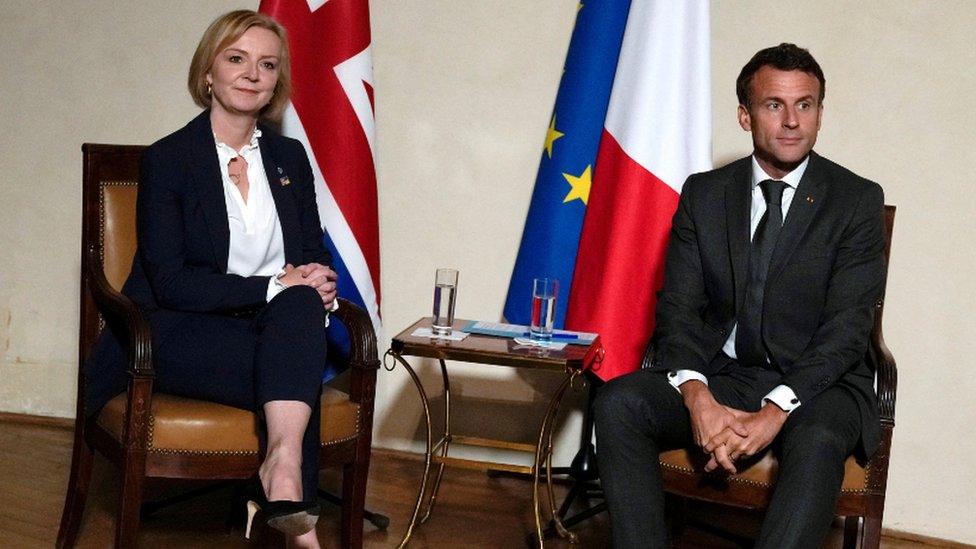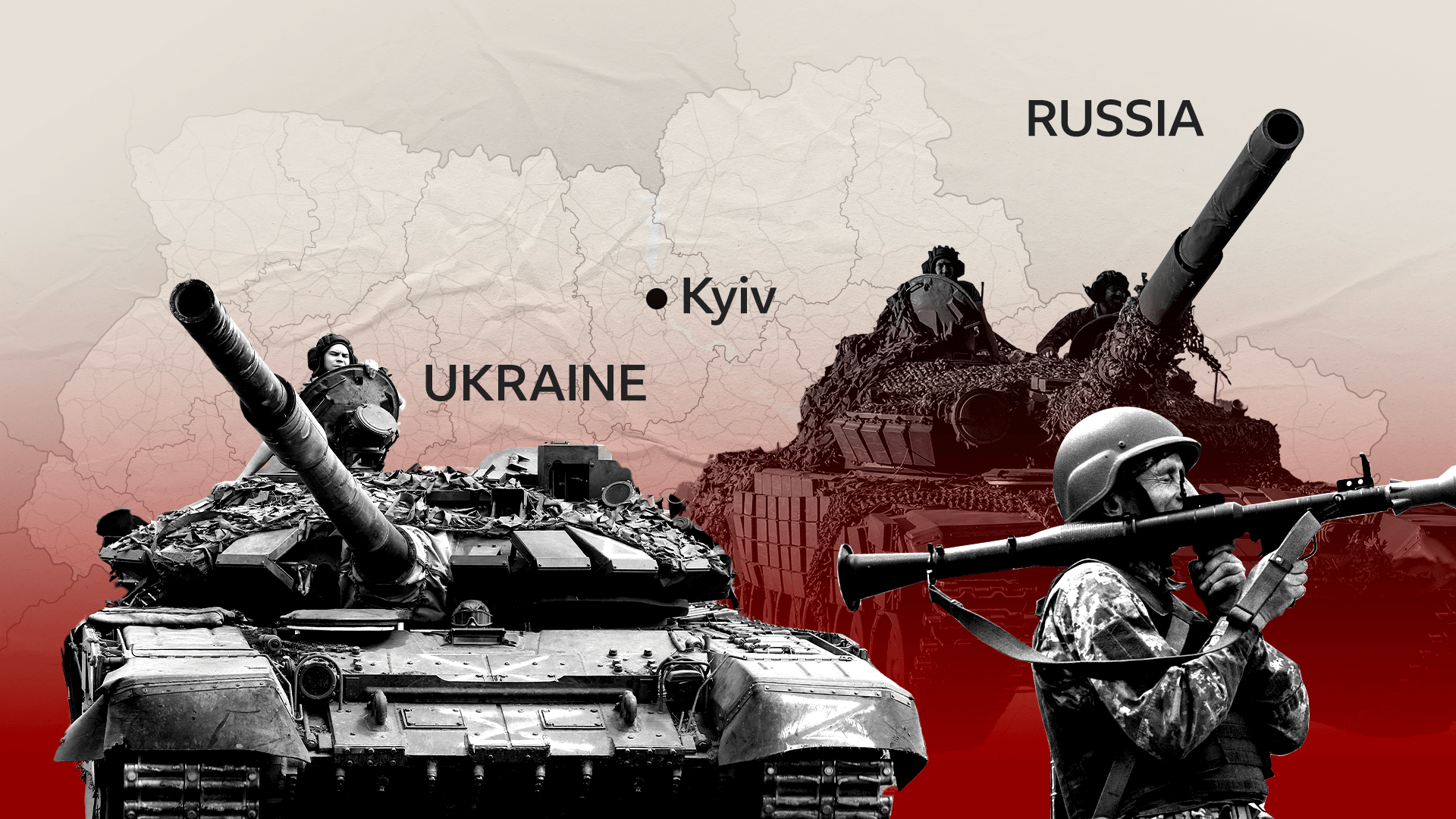Putin's dream of Russian victory slips away in Ukraine
- Published
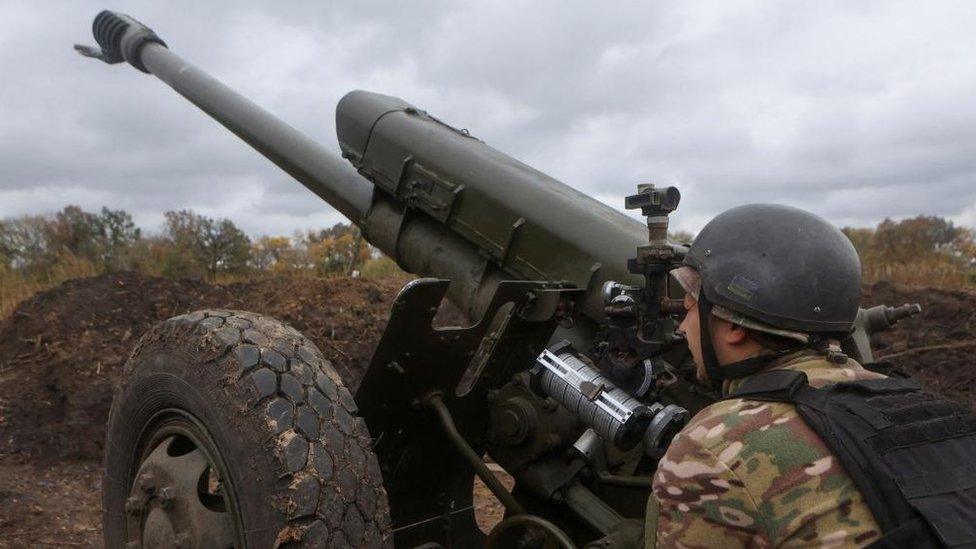
For the past month Ukrainian forces have pushed Russia's military back and recaptured large chunks of occupied territory
"The truth is on our side and truth is strength!" Vladimir Putin boomed into a microphone on Red Square last week, after a grand ceremony at which he proclaimed four large chunks of Ukrainian territory to be part of Russia.
"Victory will be ours!"
But in the real world, things look very different.
Even as Russia's president signed his illegal annexation treaties in the Kremlin, Ukrainian forces were advancing inside the areas he had just seized.
Hundreds of thousands of men have been fleeing Russia rather than be drafted to fight in an expanding war.
And things are going so badly on the battlefield that Mr Putin and his loyalists are now reframing what they once claimed was the "de-Nazification" of Ukraine and the protection of Russian speakers as an existential fight against the entire "collective" West.
That is the truth and none of it is on Russia's side.
Victim of his system
"He's in a blind zone. It seems he's not really seeing what's happening," the editor of Riddle Russia, Anton Barbashin, argues of Russia's president.
Like many, the political analyst believes that Mr Putin was caught completely off-guard by strong Western support for Kyiv, as well as Ukraine's own fierce resistance to occupation.
As he turns 70 today, after more than 20 years in power, it seems Russia's leader has become a victim of his own system. His autocratic style is impeding his access to sound intelligence.
GALEOTTI: Seven key moments that made Putin
"You can't question his ideas," explains Tatyana Stanovaya, the head of R.Politik analysis firm.
"Everyone who works with Mr Putin knows his picture of the world and of Ukraine, they know his expectations. They can't deliver him information that contradicts his vision. That's just how it works."
The president's latest address, delivered beneath the gilded Kremlin chandeliers, re-stated his vision of a new world order.
The ongoing collapse of Western hegemony is irreversible: things will never be the same. The battlefield to which destiny and history have called us is a battlefield for our people

It involves a mighty Russia, a cowed Western world that has been forced to learn respect and Kyiv subjugated once again to Moscow.
To attain that, Ukraine is Mr Putin's chosen battlefield.
Even as his ambitions appear most illusory, he looks in no mood to scale back.
"A lot of major calculations the Kremlin was working with did not pan out and it doesn't seem like Putin has a Plan B, other than keeping on pushing people to the front line and hoping that sheer numbers will prevent Ukraine from advancing further," Anton Barbashin believes.
Reluctant recruits
"Pushing people to the front" is a significant shift in itself.
Vladimir Putin continues to call his invasion a "special military operation" - styling it as limited in scope and short-lived.
Many Russians were able to accept that - even support it - while it didn't affect them directly. But the mobilisation of military reservists has turned something distant and abstract into a very close and personal risk.
Regional politicians are falling over themselves in a Soviet-style race to overfulfill their quotas, calling up as many men as possible.
"This is a shaping moment. For the majority of Russians, the war just started a couple of weeks ago," Anton Barbashin says.
"In the first months, the people dying were mostly from the peripheries and smaller centres. But mobilisation will eventually change that, as the coffins will come back to Moscow and St Petersburg."
'Simply awful' conditions
The call-up has spawned reams of social media chatter by wives and mothers of the new recruits - those who did not rush for the borders when the mobilisation was announced.
Some of their posts - and videos by the men themselves - reveal grim conditions: poor food, old weapons and a lack of basic medical supplies. The women discuss sending sanitary towels to pad the men's boots and tampons to pack their wounds.
The Kursk regional governor has described conditions in several military units as "simply awful", even down to a shortage of uniforms.
I am perplexed how the current defence ministry training unit can be in such a state: Ruined dining room; broken and rusty showers; a lack of beds and any beds they have are broken

Such revelations blow holes in one of Vladimir Putin's proudest claims: that he has rebuilt the Russian military into a professional fighting force in which patriotic citizens will want to serve.
But for now, most recruits' wives seem focused on rallying behind their troops.
"We're at the stage where a significant part of Russian society still believes that 'Russia is a great power combating Nato in Ukraine' and sending tampons, socks and toothbrushes to the mobilised is a sign of patriotism," Anton Barbashin tweeted this week.
Censorship collapses
But the mobilisation mess, and Russia's military embarrassment, are pushing more prominent figures to speak out.
When liberals condemned the Ukraine invasion, they were arrested and many are still behind bars.
Even calling it a war is illegal.
In pro-Kremlin circles, that word is now commonplace, though, as is fierce criticism of Russia's military command.
MP Andrei Kartapolov was the latest this week to urge the defence ministry to "stop lying" about Russian difficulties, because "our people are far from stupid".
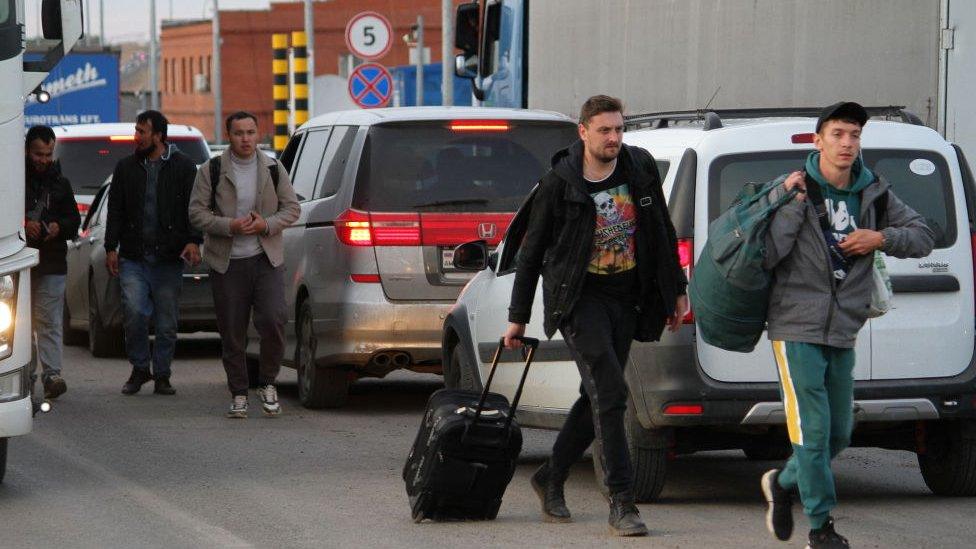
As many Russians have fled over the border with Kazakhstan as have been drafted into the army in the past two weeks
Margarita Simonyan, editor of RT television channel, cited Stalin's practice of executing "cowards" and "incompetent" generals.
But there is no public questioning of the invasion itself, let alone of Vladimir Putin.
Margarita Simonyan refers to him as "The Boss" and becomes glassy-eyed talking of the annexation of Ukrainian territory as a historic achievement.
"There is no anti-war political movement," Tatyana Stanovaya points out, especially in a politically repressive climate.
"Even those against the mobilisation are opting to escape. Some try to leave the country, others are hiding. But we don't see attempts to create any political resistance."
This could change, she says, if Russia continues to lose and suck in ever more troops.
"Putin has to deliver some victories."
ON THE GROUND: Inside Ukrainian city under fire
HUMAN COST: Bodies and burned buildings in liberated Lyman
KHERSON: Ukraine recaptures southern villages
'Holy' war with the West
Even the president hinted at problems this week, describing the situation in the annexed regions as "restive".
But there is a giant push to blame Russia's setbacks on the "collective" West which is backing Ukraine.
State media hosts are now describing the land-grab in Ukraine as something far grander, apparently buoying the nation up for a bigger fight.
"It's our war with total Satanism", no less, Vladimir Solovyov told viewers this week.
"This is not about Ukraine. The West's aim is clear. Regime change and dismembering Russia, so that Russia no longer exists," he bellowed.
That is the "truth" that Vladimir Putin believes in and it is why this moment of objective weakness for Russia is also a moment of risk.
"This war is existential for Russia and so for Putin, victory has to be possible," Tatyana Stanovaya argues.
And "he has nuclear weapons", she says bluntly.
"I think he hopes that at some level of nuclear escalation, the West will step away from Ukraine."
She's not the only one to note Mr Putin's more radical, near-messianic tone.
"It feels like this is what he actually believes: that this is the last stand of the Russian Empire, an all-out war with the West," says Anton Barbashin.
"That we're at the finish line, whether Russia makes it or not."
Of course, that's also the "truth" that Vladimir Putin now needs the West to believe, more than ever.
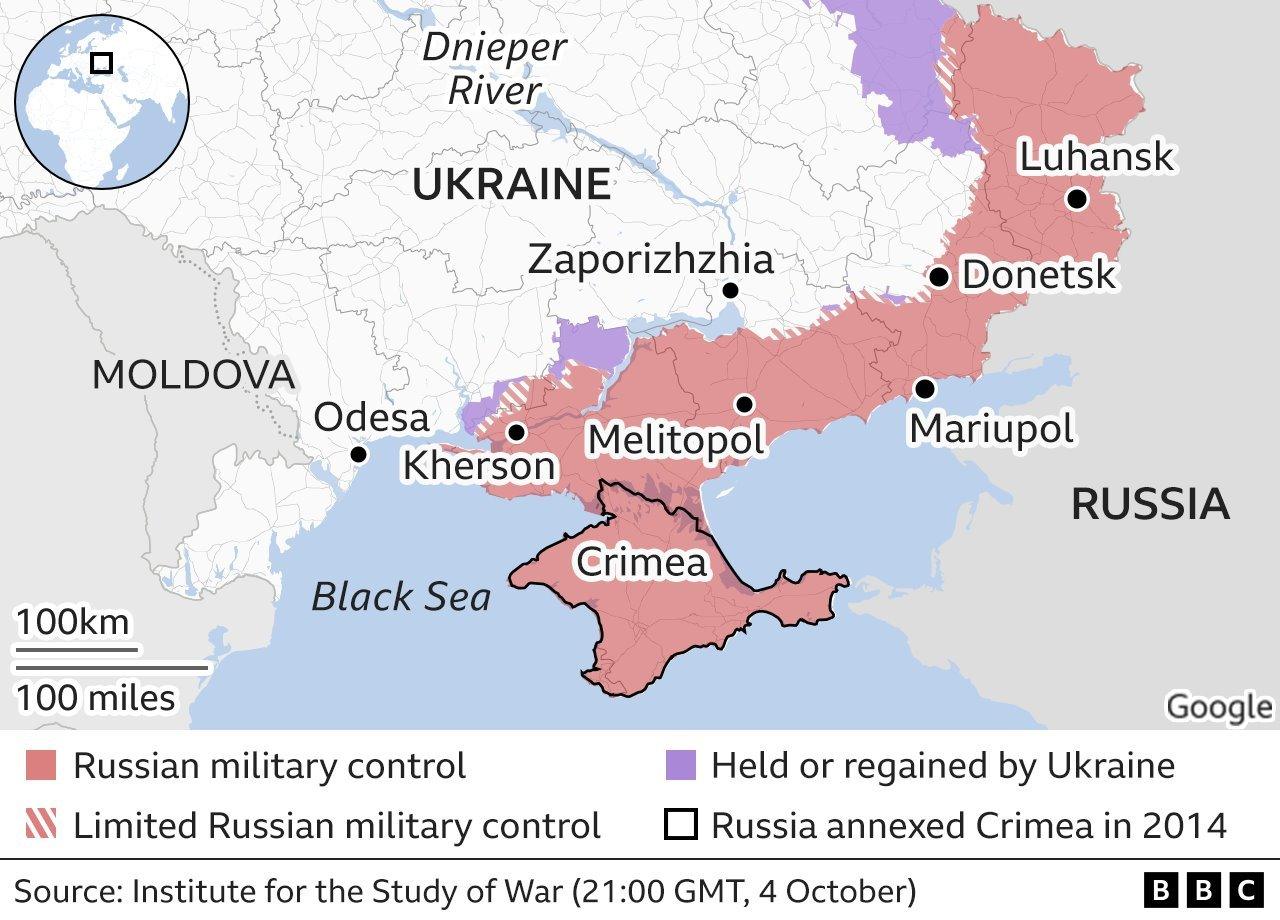
Related topics
- Published30 September 2022
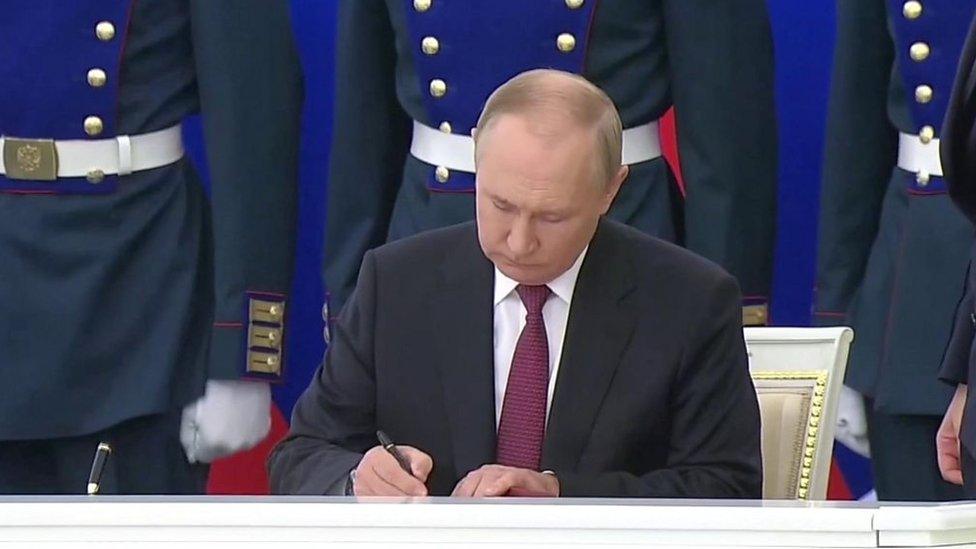
- Published5 October 2022
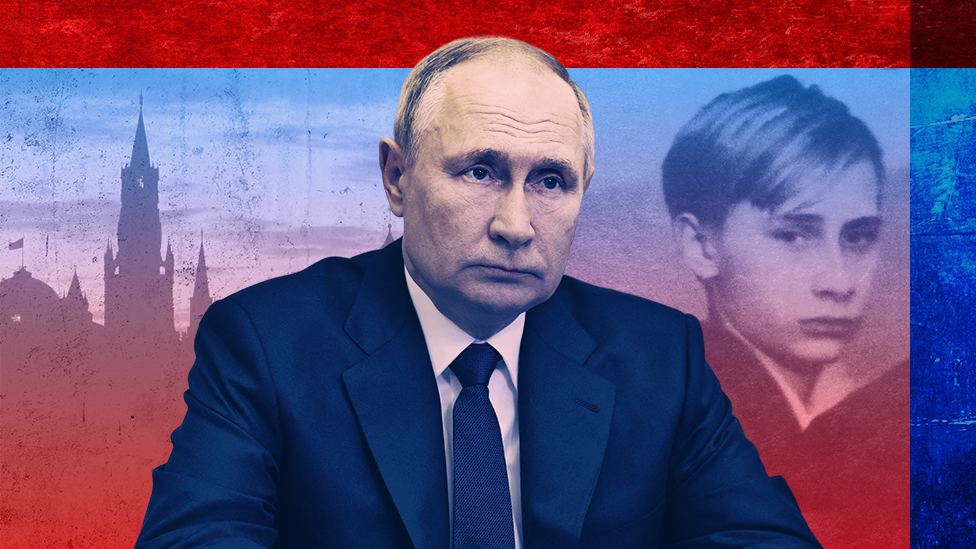
- Published6 October 2022
